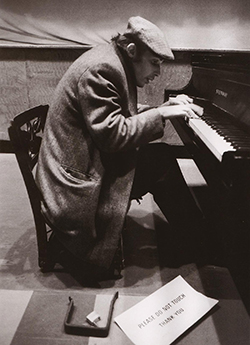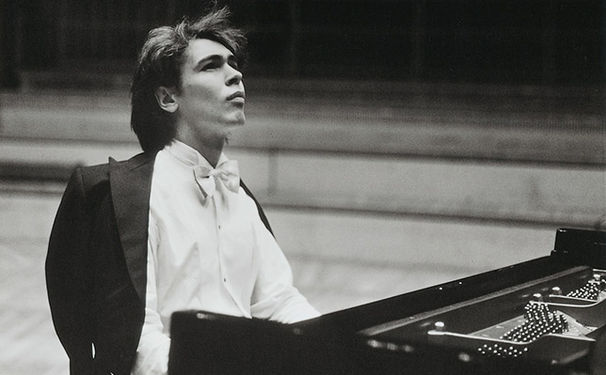A reflection on the obsession with rankings

© www.udiscovermusic.com
I have to apologise that this is a clickbait. This is not going to be a list of top 10 pianists or anything like that. But before you close this tab, I would like you to think about why you were attracted to click into this article.
I have to admit that I’m tired of seeing lists of so-called the best pianists or composers , for one simple and apparent reason – there is never an objective measure of how great an artist is. Yet, these absurd, pseudo-objective rankings are increasingly prevalent on the Internet, reflecting an incessant obsession with comparison.

Glenn Gould
Comparison, by nature, is benign if done in the right way. However, comparison is not equivalent to competition. As anyone would know and concur, unlike science, there is no absolute answer to a question in art. Indeed, it is the diversity of interpretation that makes art intriguing. Hence, these rankings do nothing beneficial but propagate the idea of objectifying something that is intrinsically abstract. I often wonder how these lists are generated — are musicians ranked by their fame, wealth or number of awards they received? Or is it an author’s personal favourites only?
By now, I hope I have convinced you why I despise this kind of lists and rankings. That being said, comparison can be beneficial. To me, it is always interesting to examine how different musicians approach the same piece, which reveals to us different styles and ways of viewing a composition.
First, let’s listen to Bach’s English Suite No.2 in A minor, played by five world-renowned pianists.
Glenn Gould:
Bach: English Suite No. 2 in A Minor, BWV 807 (Glenn Gould, piano)
Famous for his eccentricities, Gould has long been considered a master of Bach’s music. Gould had a very individualised style (together with his humming!) – each line clearly delineated, clarity in articulation and an unusually fast tempo in Allemande. On the other hand, the dancing character is less obvious.
András Schiff:
Schiff’s playing is more adherent to Baroque rhetoric and ornamentation, with the dance styles strongly characterised (especially in Bourrée) and variety in his touch.
Ivo Pogorelich:
The Prelude has turned into a showpiece under Pogorelich’s hands! Marked by virtuosity and youthful exuberance, this recording is rather rhapsodic and may be regarded as deviant by some.
Murray Perahia:
Bach: English Suite No. 2 in A Minor, BWV 807 (Murray Perahia, piano)
Perahia in general took a rather steady pace throughout the Suite with more restraint in terms of emotions.
Grigory Sokolov:
Sokolov’s approach is more “romantic” and less academic, despite the fact that Gould has been a great influence on him. He took some liberties in the Prelude, yet it is nothing short of structured, with a sense of architecture throughout.
Then, let’s move on to the recordings of Brahms’ Intermezzo in A major, Op.118 No.2 played by the same pianists.
Glenn Gould:
Brahms: 6 Piano Pieces, Op. 118 – No. 2. Intermezzo in A Major (Glenn Gould, piano)
As you may have expected, Gould pays particular attention to the contrapuntal writing in this Intermezzo; meanwhile, its expressiveness is never compromised, conveying a sense of resignation.
András Schiff:
Taken at a relatively brisk pace (I suspect that Schiff wanted to imitate human singing here), this piece sounds optimistic at the beginning, but underlying this optimism is sadness over the passing of time and ephemeral nature of our lives.
Ivo Pogorelich:
Brahms: 6 Piano Pieces, Op. 118 – No. 2. Intermezzo in A Major (Ivo Pogorelich, piano)
In this deeply personal and engaging account by Pogorelich, phrases are stretched to the point of nearly falling apart and time seems to have stopped, but the inner cohesion of the music is maintained with a strong gravitational pull.
Murray Perahia:
Brahms: 6 Piano Pieces, Op. 118 – No. 2. Intermezzo in A Major (Murray Perahia, piano)
I would describe Perahia’s approach as rather straightforward, but that doesn’t mean that it is bland. The serenity and humanity in his playing is particularly moving.
Grigory Sokolov:

Ivo Pogorelich in1987
© Susesch Bayat
Every note and phrase carefully weighed and crafted, it sounds like an aged man reminiscing about fond memories, conveying the bittersweetness contained in the music.
As said previously, there isn’t an objectively better interpretation or artist. After all, these are just different approaches to the same artwork, and we have to understand that a subjective opinion would not translate to an objective fact.
If you read until here, thank you for reading this article even knowing it is a clickbait. Think twice before clicking into “Top Pianists” or “Greatest Composers” next time!





I have always found this subject of “who is the best” or the “top ten, twenty….” to be one of the most ridiculous concepts in the world of music. I am beginning to think that people in the performing arts are somewhat “hardwired” to allow the search for “the best” to occupy their thinking. We see this concept in professional ice skating competitions. The obsession with this kind of thinking tends to place labels on people. How could a juror on an international piano competition consider one performer a genius while other committee members gave him “third” place? The musical arts are too subjective to be reduced to an obsession!! Even my own thoughts on this subject are subjective. In closing….I once had a teacher tell me that the only person necessary to be in competition with is myself. Maybe the question should be “Why do people want to be given the title…”#1, First Place, Gold Medal” etc…maybe that is the obsession. Thanks for reading.
Thank you. I wholeheartedly agree.
I think concert pianists are very much in competition with themselves. They are independent artists who function on an independent basis. The comparisons made come from fans and as you say, are very subjective. Their performances are not competitions but purely there for the enjoyment of audiences. We will always have our preferred artists, but the majority of them are amazing.
I love to listen to Sokolov. I am convinced he uses a different setup on the microphones. I think they are closer. His recordings sound louder to me than most. I hear the strings vibrate more. Sometimes I think that is a distraction.
Rosalyn Tureck for Bach.
Even Glenn Gould regarded her as his idol.
Thank you for your article; I agree completely. What’s aggravating about the dozen or so writings extolling <> is that several artists are not even considered for inclusion probably because the authors of such articles either forgot about them or never heard of them, names, for example, such as Anton Rubinstein, Ferruccio Busoni, Josef Hofmann. The list goes on.
Yes. Any list must include Irina Zahharenkova of Finland/Estonia.